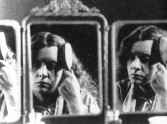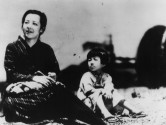
Woman of Tokyo
An Inn in Tokyo
Screening on Film
Often considered the “most Japanese” of all Japanese directors, Ozu was proclaimed “one of the greatest artists of the twentieth century in any medium and in any country” by the British Film Institute. Woman of Tokyo, one of his most powerful films, tells the story of a young woman who supports her student brother by working as a translator by day and a prostitute by night. Rediscovered in the early 1980s, Woman of Tokyo was acclaimed for its “subtle riot of discordant formal devices. . . and breathtaking wrench of perspective, from individual tragedy to matter-of-fact social breakdown.”
Often compared to the later neorealist classic The Bicycle Thief, An Inn in Tokyo chronicles three days in the life of an unemployed factory worker who wanders through Tokyo’s industrial hinterland with his two sons, looking for work. In the film’s most famous sequence, the starving family has an imaginary picnic in the midst of a bleak landscape of smokestacks. David Bordwell suggests that in its rigorous visual patterning and plaintive themes, “An Inn in Tokyo constitutes a summary of Ozu’s silent work.”



























